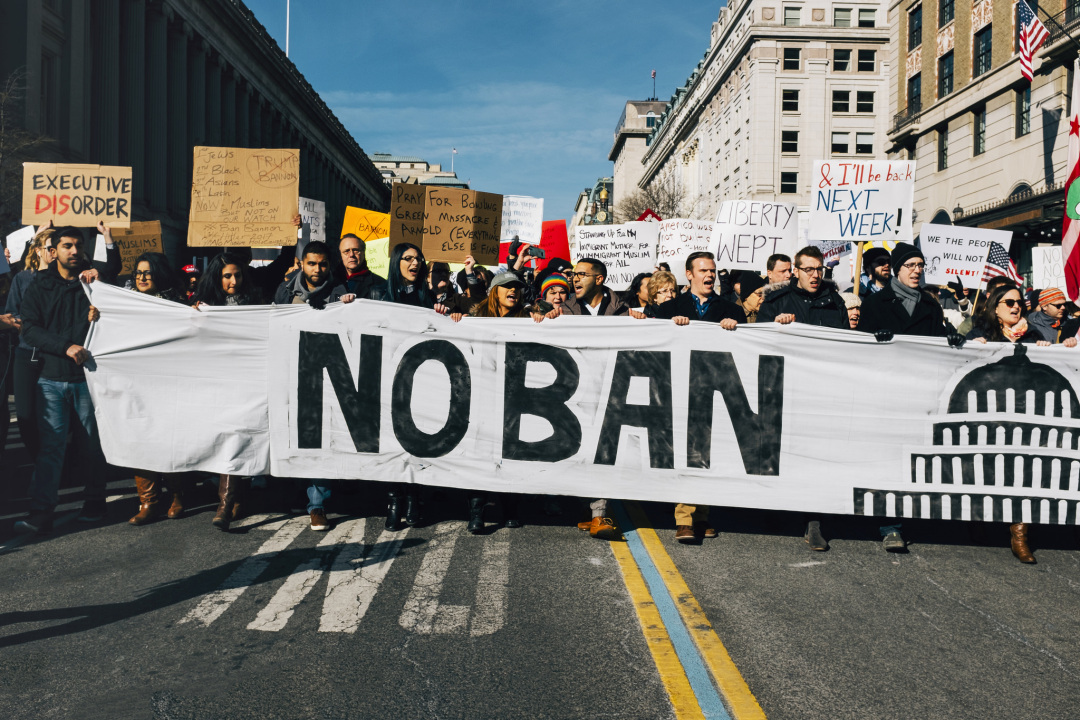
The RISE Together Fund (RTF) played a central role in the national and regional mobilization efforts surrounding the Executive Orders restricting travel for refugees and immigrants from specified countries (the “Muslim Ban”). The RTF recognized the need for MASA organizations to coordinate efforts, messaging, and mobilization efforts. A number of organizations, including MASA groups, as well as immigrant rights and civil liberties organizations, began to organize and coordinate with one another to ensure that the voices of those most impacted by the Muslim Ban were leading response efforts.
Three field groups emerged as the national anchors for the coordination efforts: Council for American Islamic Relations – San Francisco Bay Area (CAIR-SFBA), the National Immigration Law Center (NILC) and Asian Americans Advance Justice- Asian Law Caucus (AAAJ- ALC). Prior to the national coordinated campaign, the field was largely uncoordinated with sometimes conflicting public messaging on the bans.
The RTF’s initial support included a grant to NILC for a convening of over 80 organizations in July 2017. The individuals and groups represented met to coordinate tactics and strategies relating to the Muslim Ban and helped to solidify the goals and needs for the campaign. After the success of the convening, RTF committed $150,000 towards supporting the Muslim Ban campaign. Specifically, RTF funded increased time for consultants to support the field mobilization, the creation of a micro-site and technology support for the Muslim Ban campaign, as well as funding towards the activities of select regional anchors and related follow-up work following the October 18th implementation date of the new ban, and related national and regional mobilizations. RTF also funded MPower Change to organize and coordinate the national rally in Washington, DC.
A critical component to the regional mobilization coordination was the RTF’s Rapid Response Coordination Team. They hosted regular monthly calls with the field, with upwards of 75 attendees each month, individual calls with regional anchors, coordinated with the national campaign coalition, and provided swift resources to the field as new legal developments emerged. They launched the #NoMuslimBanEver campaign microsite with Indivisible that hosted the nationwide coordinated campaign events, handled press inquiries, and held several Twitter Town Halls for the campaign. The coordination was not just among MASA groups, but among legal practitioners, grassroots organizers, as well as communications specialists. Coordinators and national anchor groups were able to quickly adjust timing and strategies as the needs evolved, and were able to do so because of the investment in this shared infrastructure and several months of experience of working together.
The #NoMuslimBanEver campaign successfully led to a coordinated nationwide response against the evolving changes to the Muslim Ban. In total, there were 195 endorsers of the Campaign – the sheer number and diversity of organizations led to a truly intersectional movement. Across the country, there were 100 events (70 registered on the campaign’s website) in 20 cities. The National Mobilization effort, led by MPower Change, on October 18, 2017 was a true testament to the nature of the campaign. The program highlighted individuals from the banned countries, who shared their stories of struggle and triumph in the face of the Muslim Ban and had 4,000 attendees.
On June 27, 2018, the Supreme Court of the United States upheld the Muslim ban, siding with the Trump administration. In its 5-4 decision in Trump v. Hawaii, Chief Justice John Roberts rejected plaintiffs’ argument that the September 2017 Executive Order violates their rights under the Establishment Clause of the First Amendment – despite the multitude of anti-Muslim statements from President Trump himself, and despite the fact that the ban has had a devastating impact on the United States’ Arab and Muslim populations.
In her important dissenting opinion, Justice Sonia Sotomayor stated, “The court blindly accepts the government’s invitation to sanction an openly discriminatory policy and is essentially replacing one gravely wrong decision with another.” The Muslim ban impacts over 150 million individuals from majority Muslim countries across the Middle East and North Africa. The Muslim ban has blocked families from reuniting, stopped people from receiving much needed medical treatment, and destroyed foreigners’ chances at life-changing opportunities in education and employment.
The RTF was deeply disappointed by this news. We will continue to fund, organize, and support Muslim, Arab and South Asian (MASA) leaders and organizations throughout the United States who are fighting hate and working at the grassroots level to build an American democracy that will truly uphold human rights.